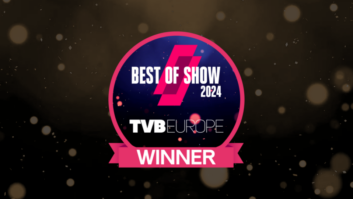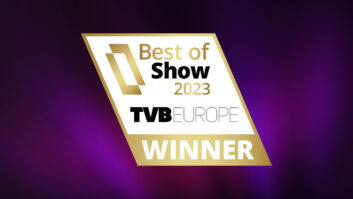The executive team behind the new BT Sport have promised the broadcaster will continue to innovate following its move to a joint venture between Warner Bros Discovery and BT.
BT Sport has always been keen to push the boundaries of both production and delivery, most recently trialling a 4K HDR workflow for the Tyson Fury v Dillian Whyte WBC heavyweight fight, as well as delivering the UK’s first 8K top-tier sport broadcast into the home.
Discussing their plans for once the joint venture clears regulatory approval, Warner Bros Discovery Sports president Andrew Georgiou; BT Sport COO Jamie Hindhaugh; and Warner Bros Discovery SVP, Content and Production, Scott Young insisted the joint venture will continue to innovate.
“It is something that Jamie has championed,” said Young. “The last thing we want to do is stop any of that innovation.
“Innovation through sports broadcasting is not just through technology, but it’s by way of the rights that we acquire and how we deliver those rights to people on the right platforms, and how we put this together under one sport ecosystem,” he continued. “So I think the innovation is not just around technology, but it’s about how we build a sports platform that is absolutely a premium to our audience. For us it means sport is entertainment, and we’re now rolling out this massive sports business into a unique entertainment platform of Warner Bros Discovery. I think how those two things mix together is going to be a great product offering for our customers.”
Hindhaugh added that BT Sport does not do innovation for innovation sake. He intends for the broadcaster to continue looking at how it engages audiences and gives them the right experience that “takes them to the heart of sport”.
“We’re all on the same page with that, but it’s doing the right things to engage the audiences and give them that access to the sport that they love,” he said.
Asked how the joint venture will work with the wider Warner Bros Discovery group when it comes to technology, Georgiou was keen to talk up the company’s content credentials.
“We produce content, whether it be kids content, premium scripted content, movie content, whatever the content genre might be, we just think about content,” he stressed. “It is really important for people who produce content to be working with people who have nothing else on their mind.”
He added that for BT Sport that means it is now working with a co-owner that is completely focused on content. “BT by the admission of Mark Allera does many different things, They’re not just a content business but they’re a telephony business and a fibre and cable business.
“We have one of the most invested technology businesses in the world. We serve from a sporting sense 50 different markets in 19 different languages,” said Georgiou. “For the Olympics that we covered in Tokyo, we had 56 simultaneous feeds coming in during one day from different events that we then had to distribute across those markets in each of those languages. We’ve got technology in our business, so taking the best of what BT’s got in technology and you look at what they’ve done, and you take what we’ve done and you put it together, we’ve got an embarrassment of riches when it comes to technology. We just need to put it to work in serving the engagement of the consumer and that’s ultimately where we’ve got to focus that technology.”
“A lot of the work we’ve done around innovation within BT Sport has been about looking at and understanding the infrastructure that is in place to be able to take content to people and connect people to content,” added Hindhaugh. “That stays. The JV brings together that strength, that strategic insight that enables the brilliant content being created to get to more people in different ways. So I think it’s a really exciting opportunity.”
Curation is likely to be a key part of the landscape going forward, said Young, following engagement seen by Warner Bros Discovery during their coverage of both the Summer and Winter Olympics.
“People want to be able to enjoy sport in the way it’s curated for them, whether it be through a traditionally produced broadcast covering a sport, or through the minutiae of being able to go into the Tokyo Olympics and choose that they’re just going to watch one sport,” he explained. “That day where we had 56 simultaneous streams we saw people enjoying the sport they wanted to watch and I think that’s where we start to really connect with our audience and work out how they want to enjoy the sport that we’re going to serve up to them. Serving the customer with the massive depth of the platforms we’ve got is going to be day two once we get past day one.”
“We’ve got passionate teams on both sides that that are looking forward to working together,” added Young. “The sports industry is actually quite small. Everybody’s been around the houses, so there are loads of people that already know each other, which is fantastic, and they’re very keen to start working together again.
“Where we produce this from, how we use remote facilities and how that helps us deliver content smarter to the audience remains to be seen. There’s a lot to work through, but there’s a lot of opportunity. The great thing with all of the team here is we see this as a massively positive opportunity for a new era in sports broadcasting,” concluded Young.







